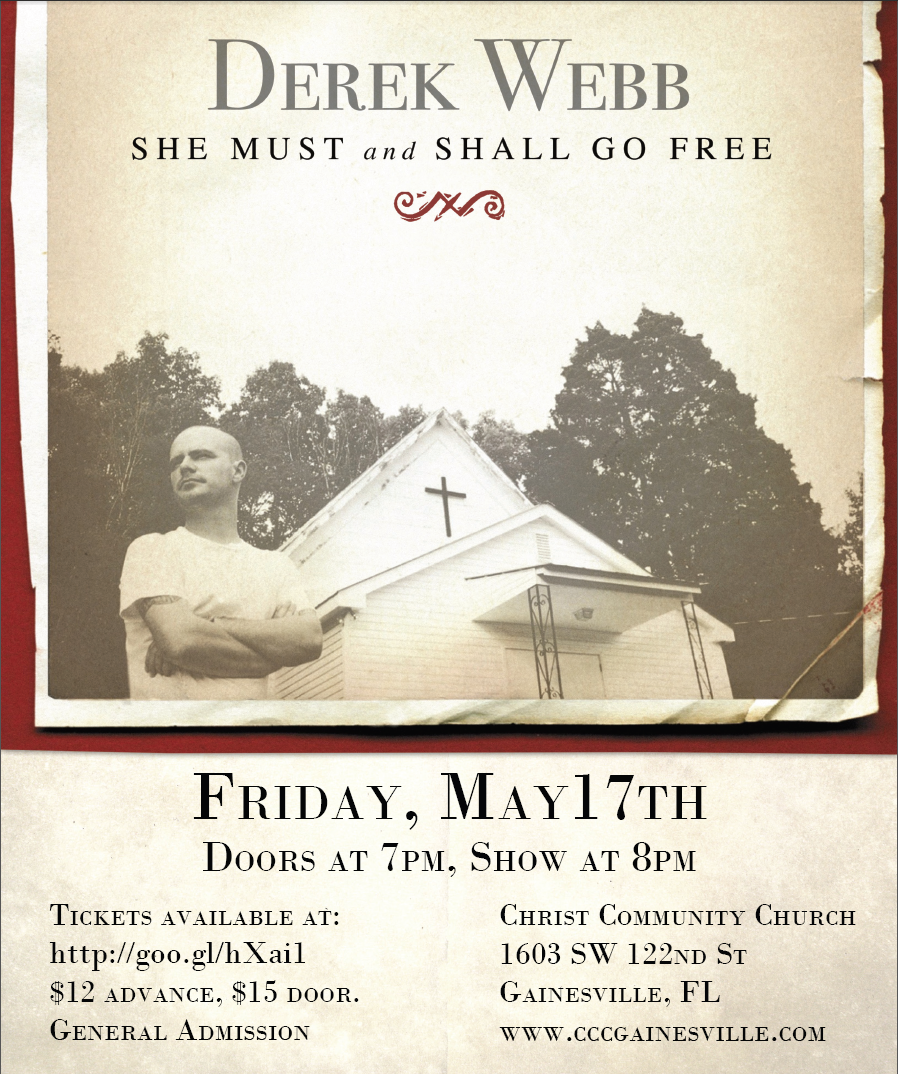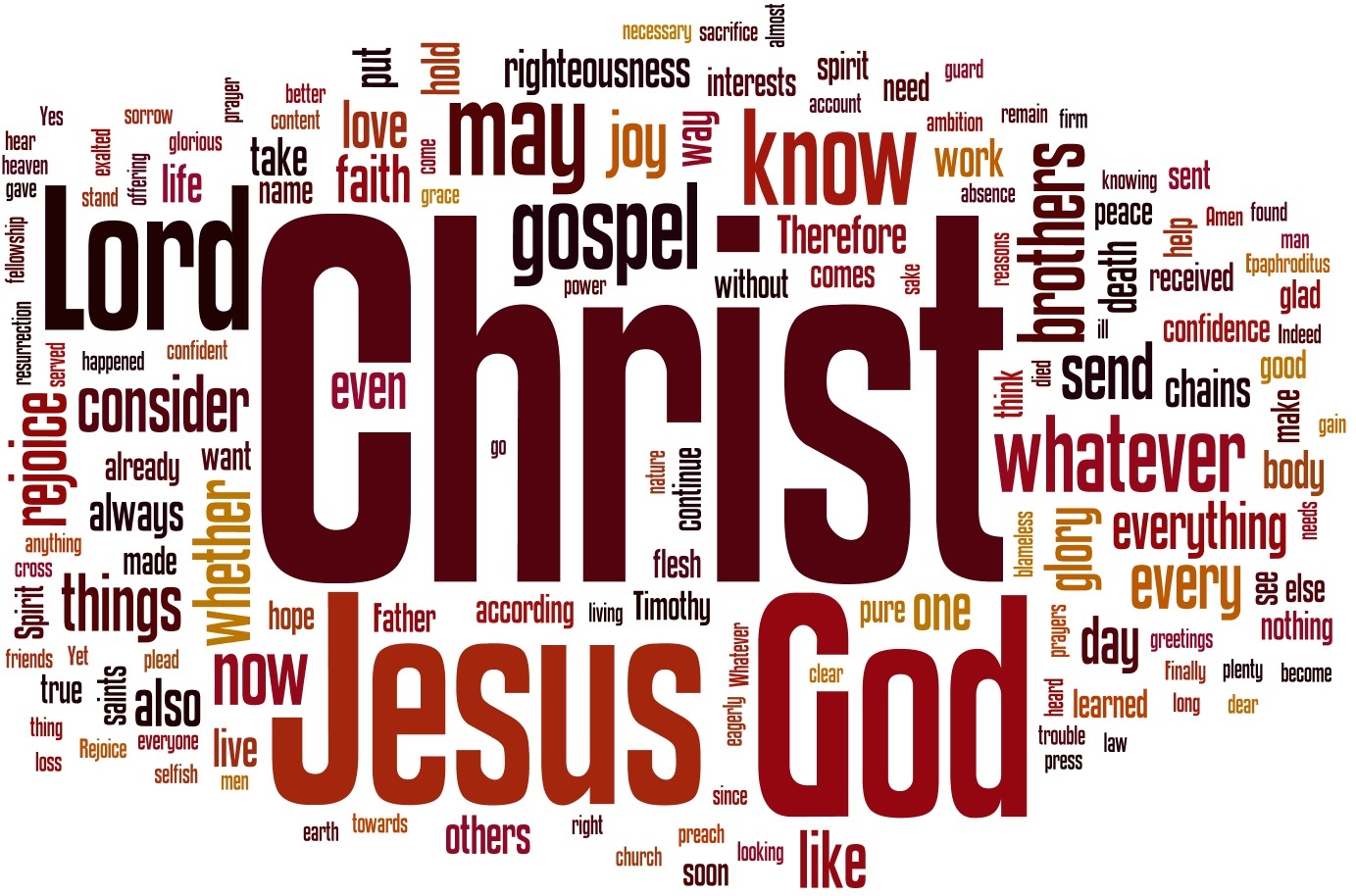On Friday, May 17, we will be hosting Derek Webb’s tour for the 10th anniversary of She Must and Shall Go Free, supported by Kenny Meeks. This ticketed event is open to the public and tickets are on sale now!
Doors: 7PM; Show: 8PM
Snag your tickets before the show and save $3 off the door price! ($12 advance, $15 at the door).
This is not exhaustive.
1.) He is God
–He’s the fully Divine Lord, of one being and equal glory with God.
2:6 though he was in the form of God, he didn’t count equality with God a thing to be grasped
–He’s the rightful possessor of the divine name (and not Caesar)2:9-11 God has highly exalted him and bestowed on him the name that is above every name, 10 so that at the name of Jesus every knee should bow, in heaven and on earth and under the earth, 11 and every tongue confess that Jesus Christ is Lord, to the glory of God the Father.
— He’s the source, together with the Father, of:
Grace & peace: 1:2 Grace to you & peace, from God our Father and the Lord Jesus Christ
Heavenly riches: My God will supply all your needs according to his riches in glory in Christ Jesus
— The Holy Spirit is the Spirit of Jesus1:19: I know that through your prayers and the help of the Spirit of Jesus Christ this will turn out for my deliverance
still working
This peculiar word (possibly an acrostic) has been popping up in our worship services over the past few months. What does it mean?
A preliminary look into “selah” will reveal some rather benign definitions that carry little meaning. A deeper look explains why: commentators, theologians and worship leaders seem to offer a resounding “We don’t know for sure, but it might mean….” That’s not to say that the word has no meaning. Of the 74 occurrences in the Bible, the majority are found in the Psalms. A more detailed look at its usage indicates a number of possibilities, one of the most common interpretations being that “selah” signals either a pause for reflection, or a musical break or interlude to the same end. I share this interpretation of the term’s meaning.
An excerpt from the excellent blog of Bob Kauflin, Worship Matters, helps make the case for this interpretation in a treatment on musical interludes in worship:
We can continue to reflect on God’s greatness and respond vocally with musical accompaniment. Many scholars think a selah in the Psalms was a time to consider what had just been said. Ps. 4:4 and 39:5 contain a selah that comes after a reflective thought, while the selah’s in Ps. 3:8 and 24:10 follow verse that are more exuberant in nature.
If you’ve attended our church for any period of time, you might have noticed that we rarely employ musical interludes in our services. Emphasis is given instead to lyrics derived primarily from Scripture itself. It’s my hope that we will all continue to seek an understanding of what we’re doing in corporate worship, so that we can more freely worship God in spirit and in truth. May He give us grace to discern the truth and wisdom found in Scripture, even in the words we struggle to understand.
Q: What is sin?
A: Sin is rejecting or ignoring God in the world he created, rebelling against him by living without reference to him, not being or doing what he requires in his law—resulting in our death and the disintegration of all creation.
In the video this week, John Lin gives a vivid example of what breaking God’s law looks like. He describes a cliff and a commandment to “not walk off it”. Why do we not walk off of it? Because it would lead to death and destruction. Why would walking off a cliff lead to death? Because of the law of gravity. Gravity is something that simply is. We have to live in reference to it because it exists. The command to not walk off the cliff is a loving boundary that requires us to respect gravity. It is the same in our personal relationships with God. He gives us commands and guidelines that respect who He is. They were given to us so that we could live our lives to their fullest capacity. God’s character is revealed through the law, and when we sin we go against His nature.
Sin is rebelling against the law and not living in reference to God. Sin came into this world through one man and sentenced all men to death. But Jesus came so that eternal life could be obtained. He was destroyed on the cross for our sin, so that we might be reunited with God and be given the ability to follow his commands, however imperfectly, with joy. Romans 6:7-11 says:
“For one who has died has been set free from sin. Now if we have died with Christ, we believe that we will also live with him. We know that Christ, being raised from the dead, will never die again; death no longer has dominion over him. For the death he died he died to sin, once for all, but the life he lives he lives to God. So you also must consider yourselves dead to sin and alive to God in Christ Jesus.”
This is week 16 of 52 catechism readings from New City Catechism. Christ Community is reciting an entry from the catechism each Sunday in 2013. To read commentaries and view a concise video teaching on each week, visit newcitycatechsim.com.
About This Blog
This blog is one of the primary ways that Christ Community's staff can connect and share information. Look for important updates on our community life here each week.
Visit the CCC Website.
View our Church Calendar.
Reminders & Reflections
Blog Archive
- June 2015
- May 2015
- April 2015
- March 2015
- February 2015
- January 2015
- December 2014
- November 2014
- October 2014
- September 2014
- August 2014
- July 2014
- June 2014
- May 2014
- April 2014
- March 2014
- February 2014
- January 2014
- December 2013
- November 2013
- October 2013
- September 2013
- August 2013
- July 2013
- June 2013
- May 2013
- April 2013
- March 2013
- February 2013
- January 2013
- December 2012
- November 2012
- October 2012
- September 2012
- August 2012
- July 2012
- June 2012
- May 2012
- April 2012
- March 2012
- February 2012
- January 2012
- December 2011
- November 2011
- October 2011
- September 2011
- August 2011
- July 2011
- June 2011
- May 2011


